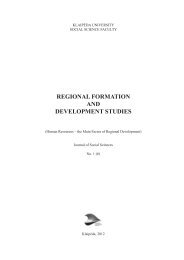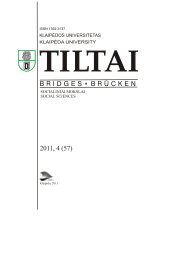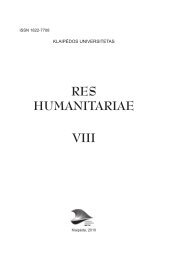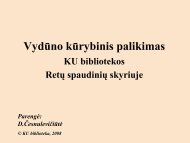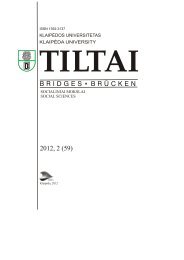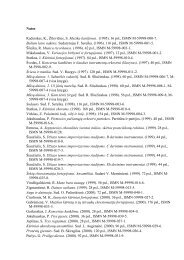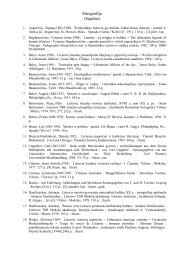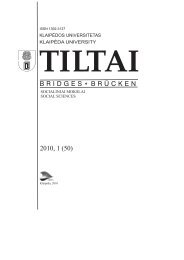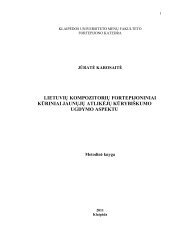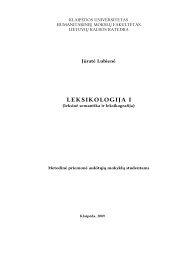2013,1 (62) - KlaipÄdos universitetas
2013,1 (62) - KlaipÄdos universitetas
2013,1 (62) - KlaipÄdos universitetas
You also want an ePaper? Increase the reach of your titles
YUMPU automatically turns print PDFs into web optimized ePapers that Google loves.
ABORTAS KAIP SOCIALINĖ PROBLEMA: PREVENCIJOS POREIKIO ASPEKTAS<br />
The methods used for the research is comparative analysis of academic literature and<br />
legislation, questionnaire survey. The empirical part (questionnaire survey) consists of the<br />
responses of 98 women that have approached counselling for pregnancy termination in<br />
Švenčionių and Visaginas town hospitals. The data analysed does not include all the target<br />
Lithuanian population but the responses gathered reflect the general tendency in the towns<br />
of Visaginas (district of Utena) and Švenčionys (district of Vilnius).<br />
The comparative analysis of academic literature and legislation acts has permitted<br />
to conclude that the problem of abortion is wide-spread in Lithuania but it is not appropriately<br />
analysed on scientific and practical levels nor it is publicly discussed. There<br />
is a lack of systematic and complex social and psychological assistance and preventive<br />
measures for women and families that would help to solve this problem. The<br />
scientific information has revealed that the reasons for abortion are often due to economic<br />
and socio-psychological factors and the termination of a pregnancy still remains<br />
the most frequently used mean for family planning. The legal regulation of<br />
abortion in the country is undetermined and insufficient because the Heath care law<br />
regulating the practise of pregnancy termination that has been passed in 1994 defines<br />
only a specific medical procedure but not the assistance possibilities for women in a<br />
situation of crises or protection of the unborn baby. From this point of view the good<br />
practice of other countries could be used when creating systems for prevention and<br />
decreasing abortions.<br />
The empirical survey has shown that most of the women from the group intending<br />
to terminate their pregnancy are married, older, with secondary education that have<br />
one or two children. Economic reasons are those listed as main reasons in the decision<br />
of terminating the pregnancy but these results are not unambiguous therefore it is necessary<br />
to investigate further in order to discover whether those are the determinant<br />
factors in the women’s choice. A qualitative study would be more appropriate to analyse<br />
the fundamental reasons. Given the data it can be deduced that most of the surveyed<br />
women already have a sense of motherhood identity, i.e. they know that they are<br />
mothers and are conscious about terminating the unborn life. It has also been learned<br />
that most of them took the decision to terminate the pregnancy together with their<br />
husbands/partners, they also discuss the issue with their female friends and their mothers.<br />
However a part of these women (20 percent) have not informed their husbands/partners<br />
about the decision. The survey has revealed that most of these women<br />
have used contraception and the decision to terminate pregnancy does not correlate<br />
with the use of contraception. The survey shows that women who intend to terminate<br />
the pregnancy would like to receive assistance from a psychologist (psychotherapist)<br />
and a social worker (social educationist). The necessity for this kind of assistance<br />
could be associated with the most cited consequences of abortion: possible health and<br />
psychological problems.<br />
In summary it can be concluded that the data of the research gives motivation for the<br />
necessity of both primary and secondary prevention, i.e. sexual education of adults and<br />
counsel-educative assistance, as well as the necessity of complex services for the family in<br />
order to seek its overall welfare. It is important for scientists and practicians, politicians,<br />
society representatives and families themselves to get involved together in this process.<br />
167



